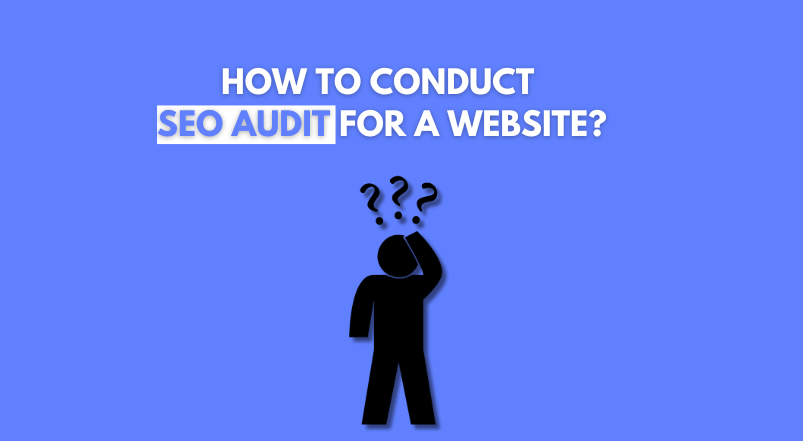
How to Conduct SEO Audit for a Website?
Conducting a comprehensive SEO audit is essential for identifying the strengths and weaknesses of your website’s search engine optimization. An SEO audit helps you understand how well your site is performing, uncover potential issues, and create a roadmap for improvements. Here’s a step-by-step guide on how to conduct a thorough SEO audit for your website.
1. Evaluate Your Website’s Performance
Start by assessing your website’s overall performance. Use tools like Google Analytics and Google Search Console to gather data on key metrics such as:
- Traffic: Analyze the number of visitors, their behavior, and how they find your site.
- Bounce Rate: Measure the percentage of visitors who leave your site after viewing only one page.
- Average Session Duration: Determine how long visitors stay on your site.
- Pages Per Session: Check the average number of pages viewed per session.
These metrics provide insights into user engagement and highlight areas needing improvement.
2. Check for Indexing Issues
Ensure that your website is properly indexed by search engines. Use Google Search Console to check for:
- Crawl Errors: Identify pages that search engines have trouble accessing.
- Indexed Pages: Confirm the number of pages indexed by search engines matches the number of pages on your site.
- XML Sitemap: Ensure your sitemap is correctly submitted and updated regularly.
Addressing indexing issues is crucial for improving your site’s visibility in search engine results pages (SERPs).
3. Analyze On-Page SEO Elements
On-page SEO is critical for ensuring your content is accessible and relevant to users and search engines. Review the following elements:
- Title Tags: Ensure each page has a unique, descriptive title tag with relevant keywords.
- Meta Descriptions: Write compelling meta descriptions that accurately summarize the content and include primary keywords.
- Header Tags: Use header tags (H1, H2, H3) to structure your content and include keywords where appropriate.
- URL Structure: Optimize URLs to be short, descriptive, and include relevant keywords.
- Content Quality: Evaluate the relevance, quality, and originality of your content. Ensure it provides value to your audience.
Optimizing these on-page elements can significantly enhance your site’s SEO performance.
4. Assess Technical SEO
Technical SEO ensures that your website meets the technical requirements of modern search engines. Focus on the following areas:
- Page Speed: Use tools like Google PageSpeed Insights to identify and fix issues slowing down your site.
- Mobile-Friendliness: Ensure your site is responsive and provides a seamless experience across all devices.
- Secure Sockets Layer (SSL): Confirm your site uses HTTPS to secure user data and boost trust.
- Canonical Tags: Implement canonical tags to prevent duplicate content issues.
- Schema Markup: Use schema markup to enhance how search engines interpret and display your content.
Addressing technical SEO issues can improve your site’s usability and search engine rankings.
5. Evaluate Off-Page SEO Factors
Off-page SEO focuses on activities outside your website that influence your rankings. Key aspects to analyze include:
- Backlink Profile: Use tools like Ahrefs or Moz to analyze your backlink profile. Look for high-quality, relevant backlinks and identify any toxic links that could harm your SEO.
- Social Signals: Evaluate your social media presence and engagement. Strong social signals can enhance your SEO efforts.
- Brand Mentions: Monitor online mentions of your brand. Encourage positive reviews and address any negative feedback promptly.
Building a strong off-page SEO strategy is essential for improving your site’s authority and credibility.
6. Conduct a Competitor Analysis
Analyzing your competitors’ SEO strategies can provide valuable insights. Identify your main competitors and assess them:
- Keyword Strategies: Determine which keywords they are targeting and ranking for.
- Content Quality: Analyze the quality and type of content they produce.
- Backlink Profiles: Examine their backlink profiles to identify potential link-building opportunities.
- Social Media Presence: Evaluate their social media engagement and strategies.
Understanding your competitors’ strengths and weaknesses can help you refine your own SEO strategy.
7. Review and Improve Content
Content is king in SEO. Conduct a content audit to:
- Identify Gaps: Determine what content is missing or needs updating.
- Update Outdated Content: Refresh old content to keep it relevant and accurate.
- Optimize for Keywords: Ensure your content is optimized for target keywords without keyword stuffing.
- Improve Readability: Use clear, concise language and break up text with headings, bullet points, and images.
Regularly updating and optimizing your content can boost your SEO performance and user engagement.
8. Monitor and Track Progress
SEO is an ongoing process. Use tools like Google Analytics, Google Search Console, and SEO auditing tools to monitor your progress. Track key metrics such as:
- Organic Traffic: Measure the growth in organic traffic over time.
- Keyword Rankings: Monitor your rankings for target keywords.
- Conversion Rates: Track how well your site converts visitors into customers or leads.
Regular monitoring allows you to adjust your strategies and continuously improve your SEO performance.
Conclusion
Conducting a comprehensive SEO audit is essential for identifying and addressing issues that could hinder your website’s performance. By evaluating your on-page and off-page SEO elements, technical SEO, and content quality, you can develop a robust SEO strategy that enhances your brand’s online presence. At EZ Brand Builders, we specialize in helping you optimize your website and achieve lasting success in the digital landscape. Follow this guide to ensure your site is performing at its best and driving meaningful results.








